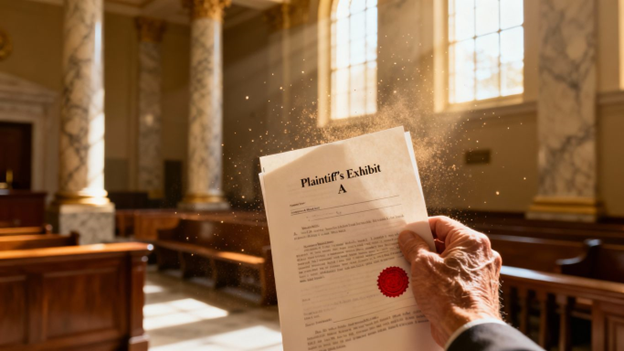Understanding The Purpose Of Asbestos Trusts
When companies that once produced or used asbestos went bankrupt, they often set up special trust funds. These trusts were created to handle claims from people who developed asbestos-related illnesses due to exposure to those companies’ products. The main goal is to provide a way for sick individuals to get compensation without having to sue the bankrupt company directly. It’s a system designed to manage a large number of claims that arose from widespread asbestos use in industries like construction, manufacturing, and shipbuilding.
Eligibility Criteria For Asbestos Trust Fund Payouts
To qualify for a payout from an asbestos trust, certain conditions must generally be met. These criteria help ensure that claims are valid and that the trust funds are used appropriately. While each trust has its own specific rules, common requirements include:
- Proof of Asbestos Exposure: You’ll need to show that you were exposed to asbestos-containing products from a company that has a trust fund set up.
- Medical Diagnosis: A medical professional must diagnose an asbestos-related disease, such as mesothelioma, lung cancer, asbestosis, or other specific conditions recognized by the trust.
- Causation: There needs to be a link established between the asbestos exposure and the diagnosed illness. This often involves medical records and expert opinions.
- Filing Within Time Limits: Trusts have statutes of limitations, meaning claims must be filed within a certain period after diagnosis or death.
The Role Of Asbestos Exposure In Trust Claims
Asbestos exposure is the cornerstone of any trust fund claim. The severity and duration of exposure, along with the type of asbestos product involved, can significantly impact the claim’s value. Trust funds often have specific medical criteria and exposure evidence requirements that must be satisfied. For instance, some trusts may require specific levels of exposure or evidence of working with particular asbestos products. Establishing a clear history of exposure is therefore paramount for a successful claim. This involves detailing where and when the exposure occurred, the nature of the work performed, and any witnesses who can corroborate the exposure history. The more detailed and verifiable the exposure evidence, the stronger the claim will be.
The Asbestos Trust Fund Payout Process
Understanding The Purpose Of Asbestos Trusts
Asbestos trusts were set up by companies that filed for bankruptcy to handle claims from people who were harmed by asbestos exposure. These trusts are meant to provide a way for individuals to get compensation without having to sue the company directly, which can be a long and difficult process, especially if the company no longer exists. The main goal is to make sure that victims of asbestos-related diseases have a source of funds for their medical bills, lost wages, and other related expenses. It’s a system designed to manage a large number of claims that arose from widespread asbestos use in the past.
Eligibility Criteria For Asbestos Trust Fund Payouts
To be eligible for a payout from an asbestos trust, a person generally needs to show a connection between their asbestos exposure and a diagnosed asbestos-related illness. This usually involves proving that the exposure happened and that it led to a specific disease, like mesothelioma, lung cancer, asbestosis, or other conditions recognized by the trust. Each trust has its own specific rules about what kind of evidence is needed and what diseases qualify. Meeting these criteria is the first major step in the claims process. Sometimes, the type of work a person did or the products they were exposed to are key factors in determining eligibility.
The Role Of Asbestos Exposure In Trust Claims
Asbestos exposure is the heart of any trust claim. Without proof of exposure, a claim won’t go anywhere. This means demonstrating that you were exposed to asbestos fibers, often through your job or environment, and that this exposure is linked to your current health condition. The amount of exposure, the duration, and the type of asbestos can all play a part in how a claim is evaluated. Evidence might include work history, medical records, and even witness statements. The more detailed and accurate the information about your exposure, the stronger your claim will be.
Types Of Asbestos Trust Funds Available
When seeking compensation for asbestos-related illnesses, it’s important to know that not all asbestos trusts are the same. Companies that faced significant asbestos litigation often established these trusts as part of their bankruptcy proceedings. The goal was to provide a way for individuals exposed to asbestos by that company to receive compensation without having to sue the company directly in court. These trusts are set up to manage claims and pay out funds to eligible claimants.
Understanding Different Trust Structures
Asbestos trusts can vary quite a bit in how they are organized and operate. Some trusts are designed to pay claims based on a set value, often referred to as a ‘value matrix.’ This matrix assigns specific dollar amounts to different asbestos-related diseases, depending on factors like severity and exposure history. Other trusts might use a ‘set value’ system, where each claim for a particular disease is assigned a predetermined amount. There are also trusts that operate with a more individualized assessment process, where the value of a claim is determined on a case-by-case basis, taking into account the specific details of the exposure and the resulting illness.
Identifying Relevant Asbestos Trusts
Finding the right trust or trusts is a key step. This usually involves identifying the specific companies whose asbestos products or materials a person was exposed to. If a company filed for bankruptcy and set up a trust, that trust would be the place to file a claim related to exposure from that company. It’s not uncommon for individuals to have been exposed to asbestos from multiple sources, meaning they might need to file claims with several different trusts. This can make the process more complex, as each trust will have its own rules and procedures.
The Impact Of Bankruptcy On Trust Funds
Bankruptcy is the primary reason these trusts exist. When a company is overwhelmed by asbestos lawsuits, it may file for Chapter 11 bankruptcy. As part of the reorganization plan, a trust is created to handle all current and future asbestos claims. This bankruptcy process is what allows the trust to exist and pay claims even after the original company may have ceased operations. The amount of money available in a trust is determined during the bankruptcy proceedings. The trust’s assets are then used to pay out claims according to its established rules. The financial health of the trust can influence how quickly claims are paid and the amounts awarded.
Maximizing Your Asbestos Trust Fund Payout
Getting the most out of an asbestos trust fund claim can feel like a puzzle. It’s not just about filing the paperwork; it’s about making sure all the pieces fit together correctly. The goal is to present a clear and complete picture of your asbestos exposure and its consequences. This helps the trust fund administrators understand the full extent of your claim.
Gathering Evidence For Your Claim
Collecting the right evidence is the first big step. Think of it as building your case. You’ll want to gather anything that shows you were exposed to asbestos and that this exposure led to your illness. This can include:
- Work History: Detailed records of where you worked, for how long, and what your job duties were. Specific companies and locations are important.
- Medical Records: Diagnoses, test results, and doctor’s notes related to your asbestos-related condition. This is key to linking your illness to asbestos.
- Witness Statements: If possible, get statements from coworkers or supervisors who can confirm your asbestos exposure at a particular job site.
- Photographs or Documents: Any old photos of work sites, pay stubs, union cards, or company newsletters that might support your work history can be helpful.
Working With Legal Counsel
While you can file a claim on your own, having a lawyer who specializes in asbestos cases can make a big difference. They know the ins and outs of these trust funds and what each one requires. A good lawyer can help you:
- Identify all the potential trusts you might be eligible for.
- Gather and organize your evidence effectively.
- Understand the specific rules and deadlines for each trust.
- Communicate with the trust administrators on your behalf.
Understanding Settlement Offers
Sometimes, a trust fund will make a settlement offer. This is a proposed amount to resolve your claim. It’s important to understand what this offer means. Your attorney can help you evaluate if the offer is fair based on:
- The severity of your illness.
- Your medical expenses and lost wages.
- The average payouts for similar claims within that specific trust.
Don’t feel pressured to accept the first offer. It’s often possible to negotiate for a better settlement, especially if you have strong evidence supporting a higher claim amount.
Common Challenges In Asbestos Trust Claims
Proving Asbestos Exposure
Figuring out exactly when and where someone was exposed to asbestos can be tricky. Many people worked in jobs where asbestos was common, like construction or manufacturing, but pinpointing the specific products or locations that caused the illness is key. Records might be old, companies may have gone out of business, or the exposure might have happened many years ago. This often requires detailed work history and medical evidence.
Navigating Trust Specific Rules
Each asbestos trust has its own set of rules and procedures. What works for one trust might not work for another. This means claimants need to understand:
- The specific claim forms required.
- The evidence needed to support a claim (like medical records, work history, and exposure details).
- The different payout levels or values assigned to various asbestos-related diseases.
It’s a lot to keep track of, and mistakes can slow down or even stop a claim.
Dealing With Denied Claims
Sometimes, claims get denied. This can happen for various reasons, such as insufficient evidence, a missed deadline, or the trust determining the exposure didn’t meet their criteria. When a claim is denied, it’s important to understand why. Often, there’s an appeals process, but this requires gathering more information or presenting the case in a different way. It can be a frustrating part of the process, especially when dealing with a serious illness.
Seeking Legal Assistance For Trust Payouts
Dealing with asbestos trust funds can be complicated. Many people find that getting help from a lawyer makes the process much smoother. These funds exist because companies that made asbestos products went bankrupt, and courts set up these trusts to pay people who got sick from exposure. It’s not always straightforward to figure out which trusts you might qualify for or what paperwork is needed. An experienced attorney can guide you through these complexities.
Why An Attorney Is Crucial
When you’re trying to get compensation from an asbestos trust, having a lawyer on your side is a big help. They understand the rules for each trust, and there are many different ones out there. A lawyer can help you:
- Gather all the necessary medical records and work history information.
- Determine which specific asbestos trusts your claim should be filed with.
- Complete and submit the claim forms accurately to avoid delays.
They know how to present your case in a way that meets the trust’s requirements. This is important because each trust has its own set of rules and payout schedules. Without proper legal help, you might miss out on compensation you’re entitled to. If you or a loved one has been diagnosed with mesothelioma, a lawyer can help you navigate the process of accessing asbestos trust funds. These funds were established by companies that filed for bankruptcy to compensate victims of asbestos exposure.
Choosing The Right Legal Representation
Not all lawyers are the same, especially when it comes to asbestos claims. You’ll want to find someone who has a proven track record with these specific types of cases. Look for a law firm that focuses on asbestos litigation and has helped many clients with trust fund claims before. Ask about their experience with the particular trusts that might be relevant to your situation. A good attorney will be upfront about what you can expect.
Understanding Attorney Fees For Trust Claims
Most asbestos lawyers work on a contingency fee basis. This means they only get paid if you receive compensation. Their fee is usually a percentage of the amount you recover. This arrangement helps make legal representation accessible, as you don’t have to pay large upfront costs. Always discuss the fee structure clearly with your attorney before you agree to work together. This way, there are no surprises down the road about how much they will take from your settlement.







